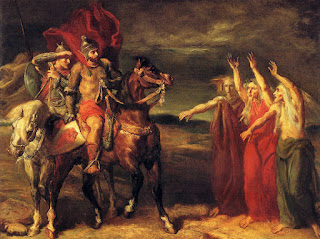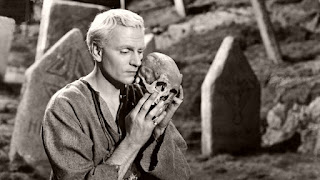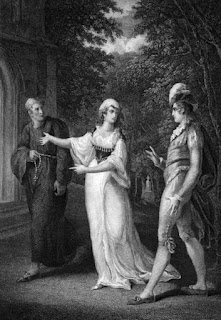 |
| Macbeth and the Three Witches |
Hullo, everyone! Today I’m bringing you the final post in my series about William Shakespeare and his plays! Z is not a common letter in Shakespeare. But I’m quite pleased that I have only had to cheat twice.
So, here we go. Z is for Zzzz… in other words, sleep.
You wouldn’t think it would be important in this kind of story, but it does give you something to think about.
People have nightmares in Shakespeare. In Richard III, for example, George of Clarence, Richard’s brother, has one early in the play. He makes a very long speech about it, to Robert Brakenbury, who runs the Tower prison. Here is a link, as it’s too long to quote in full.
http://www.shakespeare-online.com/plays/richardiii_1_4.html
Interestingly, while his brother plays a part in the nightmare, Clarence doesn’t think of him as doing anything bad on purpose. He says Richard fell overboard and accidentally knocked him off too.
Soon after, he is taken away and drowned in a butt of malmsey wine; the nightmare was an omen.
Near the end of the play, Richard himself has a bad night, just before his final battle, approached by the ghosts of his victims, while Richmond, the future Henry VII, has a sweet sleep.
At least these guys sleep. That is more than can be said for the Macbeths.
At the start of the play, Lady Macbeth talks her husband into killing the king in his sleep. Then she finishes the job by smearing blood over the faces of King Duncan’s sleeping servants, to lay the guilt on them. Macbeth then kills then and says, basically, “Oh, I had to kill them, they killed the king, I got so angry!”
So, this unpleasant couple are punished via sleep - or lack of it, anyway.
In Macbeth’s case, he hears a voice say, “Sleep no more, Macbeth doth murder sleep.” Which he has, by killing the king and his attendants, all while they are asleep.
He realises this, so perhaps insomnia is the price of his feelings of guilt; sleep is for the innocent. “…the innocent sleep that ravels up the sleeve of care, the death of each day’s life, sore labour’s bath, balm of hurt minds, great nature’s second course.”
It’s a great way to think of sleep!
You would think that a villain like him, willing to kill and keep killing to get the throne and keep it, would sleep quite soundly, feeling no guilt whatever once it’s done, but no.
Lady Macbeth’s guilt leads to sleepwalking and eventually suicide. She sleeps all right, but during her sleep she relives all the stuff she did on that dreadful night. That night, she said, “A little water clears us of this deed,” while keeping her head, but now she washes and washes, and “All the perfumes of Arabia will not sweeten this little hand.”
So, both guilty parties pay for their evil deeds with their precious sleep.
It does seem the punishment fits the crime!
One more Shakespeare tidbit, though not about sleep. Did you know that Tolkien’s Ents, those sentient walking trees, were inspired by this play? It’s true!
Like so many of us, including me, he thought the bit about Birnam Wood coming to Dunsinane was cheating. What connection did it have to a bunch of soldiers carrying branches, for goodness’ sake? It annoyed him, so he thought, what would happen if Birnam Wood really could come to Dunsinane?
And that is how the Ents were born!
See you Monday for my concluding post! I hope you have enjoyed this journey through the stories of the Bard as much as I have writing them.








